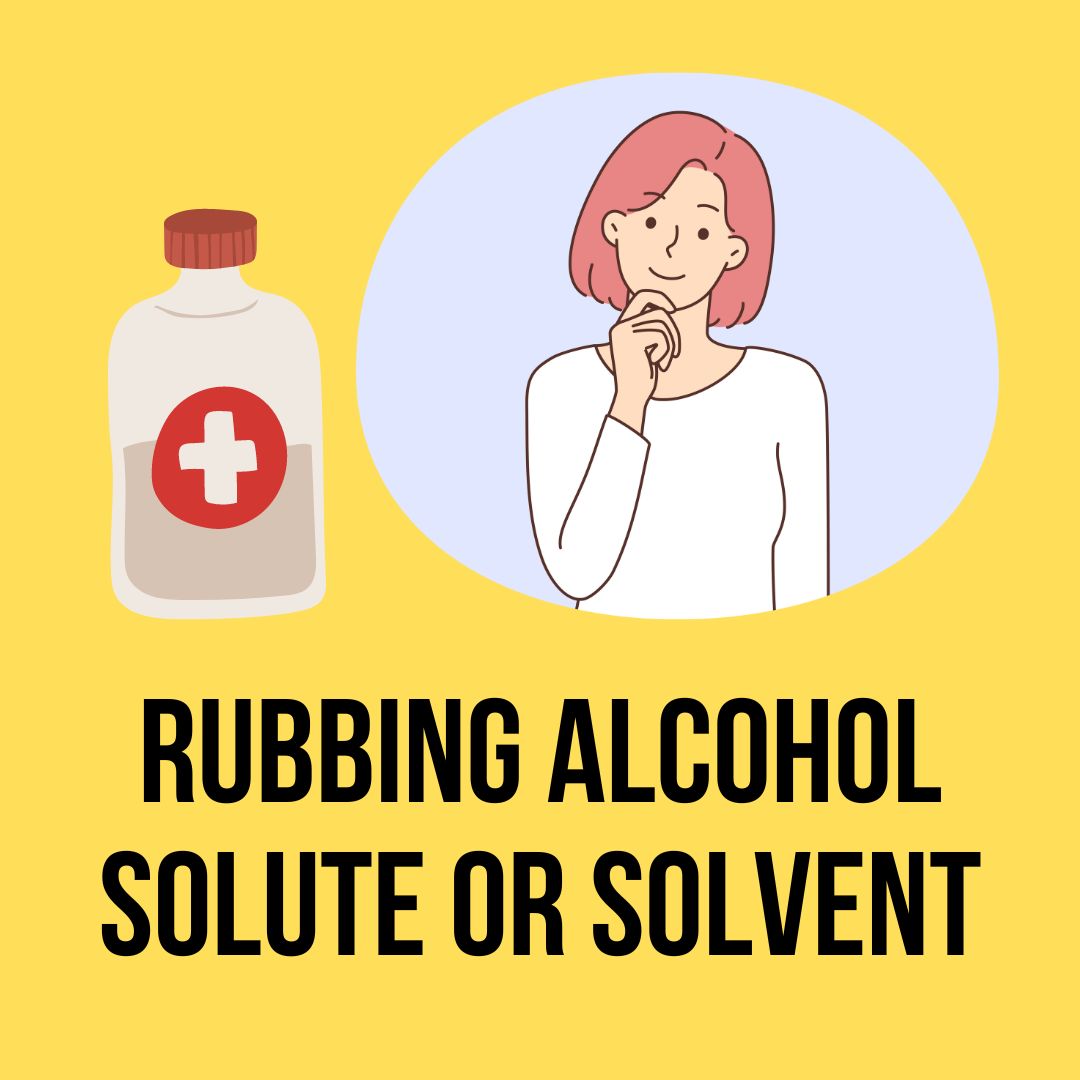
Is Rubbing Alcohol A Solute Or Solvent? Rubbing alcohol, scientifically known as isopropyl alcohol (IPA), is a commonly used substance with versatile properties. In the context of solubility, understanding whether rubbing alcohol acts as a solute or solvent depends on the specific solution being discussed. This article explores the role of rubbing alcohol as a solute or solvent, providing examples to illustrate its behavior in different scenarios.
Defining Solute and Solvent:
Before delving into the role of rubbing alcohol, it’s essential to understand the terms “solute” and “solvent.”
- Solute: A solute is a substance that dissolves in a solvent to form a solution. It is typically present in smaller quantities in a solution.
- Solvent: A solvent is a substance that can dissolve a solute, resulting in the formation of a homogeneous mixture called a solution. The solvent is usually the component present in larger quantities in the solution.
Rubbing Alcohol as a Solvent:
1. Medical Applications:
- In many medical and healthcare contexts, rubbing alcohol (isopropyl alcohol) serves as a solvent. It is used to dissolve and dilute medications, antiseptics, and disinfectants. For example, a solution containing isopropyl alcohol may be used to clean and disinfect medical instruments or skin.
2. Cleaning Agents:
- Rubbing alcohol is a common ingredient in household cleaning solutions. When mixed with water or other cleaning agents, it acts as a solvent to dissolve and remove dirt, grease, and various contaminants. The solution formed is effective in sanitizing surfaces.
Rubbing Alcohol as a Solute:
1. Mixing with Water:
- When isopropyl alcohol is mixed with water, it acts as a solute. The alcohol molecules dissolve in water molecules, forming a homogeneous solution. The resulting mixture is often used as a disinfectant or as an ingredient in various DIY cleaning solutions.
2. Examples of Isopropyl Alcohol as a Solute:
- Hand Sanitizer: Isopropyl alcohol is a key ingredient in hand sanitizers. In this case, it acts as a solute, blending with other components to create an effective hand disinfectant.
- Rubbing Alcohol Wipes: Wipes soaked in a solution containing isopropyl alcohol use the alcohol as a solute to provide antiseptic and cleaning properties.
Solubility of Rubbing Alcohol:
1. Solubility in Water:
- Isopropyl alcohol is miscible with water, meaning it can dissolve in water in any proportion. This solubility in water enhances its effectiveness in various applications, including medical uses and cleaning solutions.
2. Solubility in Organic Compounds:
- Isopropyl alcohol is also soluble in many organic compounds. This characteristic makes it a versatile solvent in different industries, including pharmaceuticals, cosmetics, and the production of various chemical products.
Rubbing Alcohol in Chemistry Experiments:
1. Extraction Processes:
- In chemistry laboratories, rubbing alcohol may be used in extraction processes where it acts as a solvent. For instance, it can be employed to extract specific compounds from plant materials.
Conclusion:
In conclusion, the role of rubbing alcohol as a solute or solvent depends on the specific context and application. In medical and cleaning contexts, rubbing alcohol often acts as a solvent, dissolving substances to create effective solutions. When mixed with water or other components, it can also act as a solute, forming homogeneous mixtures with various applications. Understanding the solubility of rubbing alcohol is crucial for utilizing its versatile properties in a range of fields, from healthcare to chemistry and beyond.
Related FAQ’S
1. Solvent in Rubbing Alcohol:
- The solvent in rubbing alcohol is water. Rubbing alcohol, also known as isopropyl alcohol (IPA), is typically composed of approximately 70% isopropyl alcohol and 30% water.
2. Solute and Solvent in 70% Rubbing Alcohol:
- In 70% rubbing alcohol, the solute is isopropyl alcohol, and the solvent is water. The solution is composed of 70 parts isopropyl alcohol and 30 parts water, creating an effective disinfectant and cleaning solution.
3. Is Alcohol the Solute in Rubbing Alcohol?
- Yes, in rubbing alcohol, which is a solution of isopropyl alcohol and water, alcohol (isopropyl alcohol) acts as the solute. It is the component that is dissolved in the solvent, which is water.
4. Is Isopropyl Alcohol Soluble in Water?
- Yes, isopropyl alcohol is soluble in water. It forms a homogeneous mixture when mixed with water, and this solubility is a key characteristic that enhances its effectiveness in various applications, including as a disinfectant and cleaning agent.
5. Does Rubbing Alcohol Dissolve?
- Yes, rubbing alcohol dissolves in water and other solvents. The ability to dissolve makes it versatile in various applications, including medical, cleaning, and laboratory uses.
6. Type of Solution in Rubbing Alcohol:
- Rubbing alcohol is an aqueous solution, meaning it is a solution in which water is the solvent. The isopropyl alcohol dissolves in water to create a uniform mixture.
7. Solute and Solvent in Hand Sanitizer:
- In hand sanitizer, the active ingredient is often isopropyl alcohol or ethanol. In this case, the alcohol (isopropyl alcohol or ethanol) acts as the solute, and the solvent is typically water or a water-based gel. The combination creates an effective hand disinfectant.

My name is Logan, and I’m a 36-year-old dad who owns a small pressure-washing company in the suburbs of Atlanta, Georgia. My main goal with rubbing-alcohol.com is to show you how versatile isopropyl rubbing alcohol can be! I hope. You find it useful.
